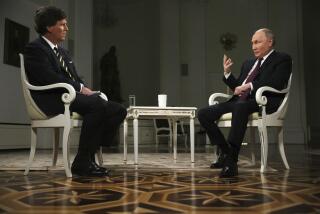A Reassuring Putin Leaves Journalists Wary
- Share via
MOSCOW — In a sometimes stormy confrontation in the Kremlin on Monday, President Vladimir V. Putin heard out a group of journalists who fear that the state wants to take over the country’s sole private television network and limit editorial freedoms.
For more than three hours, Putin tried to convince employees of NTV network that he respects their independence, and that he wishes the network to remain outside of state hands. Nevertheless, the employees said they left feeling that what they see as a Kremlin-orchestrated campaign to wrest control of NTV would continue.
“Putin insisted that he supports retaining the journalistic staff and keeping the station nongovernmental. But how much he convinced us, that’s another question,” Yevgeny Kiselyov, NTV’s director general, told reporters.
Most of the 11 journalists who met with Putin are household names in Russia. The public disagreement over NTV’s fate is one of the most significant acts of dissent Putin has faced since taking power last year and gradually imposing tighter controls on Russian society, including the media.
Kiselyov said the journalists’ sometimes impassioned reaction in the meeting was to be expected: “We are in pain, and we are screaming.”
Participants said they tried to underline to Putin that the staff of NTV is united and that the Kremlin would be embarrassed by mass resignations if a takeover by the state occurs. News anchor Marianna Maksimovskaya told Echo of Moscow radio: “Very many people will leave, and there’s no way we’ll leave quietly.”
Monday’s showdown came after Svetlana Sorokina, host of “Glas Naroda” (“The Voice of the People”) program on NTV, challenged Putin on the air Friday to meet NTV correspondents to explain why NTV journalists were being summoned for questioning by prosecutors last week. Shortly afterward, Putin phoned her and invited the journalists to the Kremlin’s presidential library.
Putin’s press secretary, Alexei Gromov, said the president told the journalists that their editorial criticism was “useful” and that Putin wishes “to preserve the NTV journalistic team, irrespective of who holds controlling interest” in the company.
Putin denies trying to silence NTV, which was thought to have annoyed Kremlin loyalists with its sharp criticism of the war in Chechnya and with its biting political satire program, “Kukly” (“Puppets”).
According to the journalists, he said at the meeting that he does not control the prosecutor, who is free to pursue allegations that NTV’s parent company, Media-Most, committed fraud by overstating its assets when it sought a loan from the state-owned Gazprom conglomerate.
Since June, the prosecutor general has been after Media-Most and its founder, Vladimir A. Gusinsky. Claiming the charges were trumped up and politically motivated, Gusinsky went into voluntary exile in Spain and is now under house arrest there. He is fighting a Russian request for his extradition.
Gazprom, which had been a creditor to Gusinsky’s Media-Most, argues that because of a series of recent court orders it now has a de facto majority of the media conglomerate’s stock. Gusinsky denies that and is trying to sell part ownership of NTV to U.S. media tycoon Ted Turner and financier George Soros to guarantee its editorial independence.
At the meeting Monday, Putin revealed that he sent a letter last Tuesday to Turner, the founder of the Cable News Network, expressing support for foreign investment in Russian media companies but not mentioning NTV specifically. Turner has sought a guarantee from Putin that if he invests in NTV, the network will be free of state interference.
Viktor Shenderovich, presenter of the “Kukly” program, said he did not believe that the NTV employees had swayed Putin.
“No ‘enemy propaganda’ could knock him out of gear. He was as hard as flint inside,” Shenderovich said.
Pavel I. Voshchanov, political analyst with the newspaper Tribuna, which is not part of Media-Most, said Putin’s argument that the prosecutor is acting independently and not at the Kremlin’s behest would be unconvincing to the Russian public.
“All Russian citizens are 100% sure today that the prosecutor general’s office is totally dependent on the president, his administration and the government,” Voshchanov said.
*
Alexei V. Kuznetsov of The Times’ Moscow Bureau contributed to this report.
More to Read
Sign up for Essential California
The most important California stories and recommendations in your inbox every morning.
You may occasionally receive promotional content from the Los Angeles Times.













